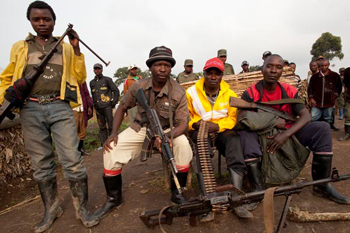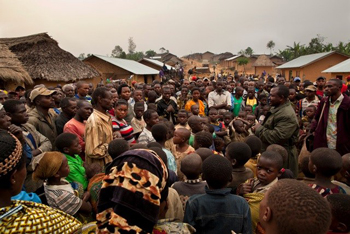"Horror Grips Me"
Remembering Congo
For Sunday September 22, 2013
Lectionary Readings (Revised Common Lectionary, Year C)
Jeremiah 8:18–9:1 or Amos 8:4–7
Psalm 79:1–9 ot Psalm 113
1 Timothy 2:1–7
Luke 16:1–13
While the world is focused on Syria, I keep thinking about Congo. You have to look hard for news about Congo, which is revealing, given all the hand-wringing about the moral obligation of the world to help the helpless in war zones. But consider these two items.
On March 28, 2013, the famously impartial United Nations did something it's never done before. The Security Council unanimously approved Resolution 2098 to send an "intervention brigade" of 3,000 troops to "neutralize and disarm" M23 rebels in the Democratic Republic of the Congo. It's the first time that the UN will oversee combat troops as opposed to "peacekeepers." The "intervention brigade" was deployed late this summer.
And this month, a film called This is Congo by Daniel McCabe is scheduled for release. I urge you to see it. For details, here's the film's website: http://www.thisiscongo.com/.
I learned about the film when the New York Times featured McCabe's five minute "op-doc": http://www.nytimes.com/video/2013/07/22/opinion/100000002350917/congo-the-road-to-ruin.html.
 |
It takes a great leap of moral imagination to comprehend the death and devastation wrought by the protracted wars in the Congo (formerly Zaire). According to a 2008 study by the International Rescue Committee, 5.4 million "excess deaths" occurred in the Congo from 1998 to 2007. That's a staggering ten percent of the population and a death toll seven times greater than the Rwandan genocide.
Over half of those deaths occurred since the war "ended" in July 2003. The overwhelming majority of the victims were civilians; about half of them were children.
Millions more Congolese have fled to neighboring countries as both a cause and consequence of the war. Hundreds of thousands of women have been raped. Peace accords officially ended the war, although continued hostilities, along with the social, economic and political consequences of the war, make for a fragile peace. Resolution 2098 is a combination of good and bad news. Help is coming, but the war's not really over.
It's the deadliest conflict in the world since World War 2, and also the most under reported. The DRC is invisible to most of the world. After all, it's just Africa. It would never occur to the United States to spend a billion dollars a month in the DRC, as it is now considering in Syria.
The "weeping prophet" Jeremiah in this week's Old Testament reading assumes an eerily modern echo. I've substituted one geographic reference to update his prophecy.
O my Comforter in sorrow,
my heart is faint within me.
Listen to the cry of my people
from a land far away:
"Is the Lord not in Congo?
Is her King no longer there?
The harvest is past,
the summer has ended,
and we are not saved."
Since my people are crushed, I am crushed;
I mourn, and horror grips me.
Is there no balm in Congo?
Is there no physician there?
Why then is there no healing
for the wound of my people?
How do you understand a war in a country the size of western Europe (the twelfth largest in the world), with 200 ethnic groups, the participation of nine border countries, the interventions of countries like France, Belgium, the United States, Cuba, and China, and thirty rebel militias and proxy armies composed of mercenaries from as far away as Serbia?
There's Gerard Prunier's book Africa's World War; Congo, The Rwandan Genocide, and the Making of a Continental Catastrophe (2009). Here at JwJ I've reviewed Jason Stearns's book Dancing in the Glory of Monsters; The Collapse of the Congo and the Great War of Africa (2011), and Peter Eichstaedt's Consuming the Congo; War and Conflict Minerals in The World's Deadliest Place (2011).
The Congo suffered four hundred years of political disintegration that began with the European and Arab slave trade of the sixteenth century, and was followed by the wholesale plunder of the region in the nineteenth century by Belgium's King Leopold (see King Leopold's Ghost by Adam Hochschild).
When independence from Belgium came in 1960, the Congolese were hardly ready to rule their vast country. For thirty-two years president Joseph Mobutu Sese Seko, who was backed by the United States, epitomized corruption, repression, and incompetence (1965–1997). Laurent Kabila overthrew Mobutu in 1997, was himself assassinated in 2001, and then followed ten days later by his son Joseph Kabila.
Scholars sometimes refer to two wars in Congo.
The trigger for the "first" Congolese war was the 1994 Rwandan genocide, when mainly Hutu people slaughtered 800,000 Tutsis in three months. A million Hutus then fled two hundred miles west into eastern Congo, set up a government in exile, and were pursued by the new Tutsi government that sought retaliation. Mobutu supported the Hutus against Rwanda's Tutsi government. About 50,000 refugees perished in the first month from starvation, cholera, thugs, and massacre by the Rwandan government. This "first" Congo war lasted until Kabila overthrew Mobutu in 1997.
The "second" Congo war pitted Kabila against Uganda and Rwanda in more obvious economic conflicts from 1998 until the peace accords of 2003. But like the layers of an onion, the Congo conflict contained "wars within wars" that were the product of many causes.
Self-defense and retaliation were obvious. Political ideologies played a role. Economic plunder of Congo's vast natural resources threatened about the only way Congo could pay for its war. The regional politics of nine neighboring states exacerbated conflicting interests.
It's easy to criticize the deep ethnic hostilities, but as Stearns notes, ethnicity was the last and strongest personal and institutional identity left in the country after the near complete erosion of the state. He concludes: "The Congo war had no one cause, no clear conceptual essence that can be easily distilled in a couple of paragraphs. Like an ancient Greek epic, it is a mess of different narrative strands."
Eichstaedt focuses on the "second" war, which pitted Kabila's hapless and corrupt government against Uganda, Rwanda, local miners, and numerous militias in the plunder of Congo's vast natural resources of copper, cobalt, coltan, gold, and diamonds. He takes his readers to the sprawling refugee camp in Goma, which was built to accommodate 50,000 people but is now "home" to 600,000. He interviews UN experts, gold miners, rape victims, pastors, journalists, village chiefs, and people up and down the supply chain of Congo's "conflict minerals."
Congo's minerals supply only a small percentage of those that end up in our electronic gadgets like cell phones (contrary to inflated figures repeated by advocacy groups). But in a horribly impoverished country, a small percentage of a big number ads up to billions of dollars, almost none of which end up helping ordinary citizens and their communities.
 |
While "name and shame" campaigns might feel good, says Eichstaedt, and the rest of the world has an obligation to do its part, only Africans can solve Africa's problems.
Christians can follow Paul's instructions from this week's epistle, which in light of recent events in Congo take on a new urgency: "I urge that requests, prayers, intercession and thanksgiving be made for all people — for kings and all those in authority, that we may live peaceful and quiet lives."
Go see the movie This is Congo. Host it in your church. Share it with your friends. And pray.
The photos are from the This is Congo film website: http://www.thisiscongo.com/.
Image credits: (1) ThisIsCongo.com; (2) Greenwichmeantime.com; and (3) ThisIsCongo.com.





